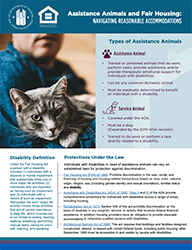BY BRAD BECKETT ON JANUARY 9, 2023
The U.S. Department of Housing & Urban Development recently issued a fact sheet to educate housing providers and others involved in housing transactions with information about reasonable accommodations related to assistance animals. Click here to read more.
The fact sheet was intended as a supplementary to a webinar titled “Assistance Animals and Fair Housing: Navigating Reasonable Accommodations.” and was prepared by HUD’s Office of Fair Housing & Equal Opportunity (FHEO).
Types of Assistance Animals
Assistance Animal
- Assistance animals are not pets.
- Trained or untrained animals that do work, perform tasks, provide assistance, and/or provide therapeutic emotional support for individuals with disabilities.
- Can be any common domestic household animal.
- Assists a person with a disability-related need.
- Covered under the Fair Housing Act.
- A reasonable accommodation must be granted where there is a nexus between a person’s disability and the requested accommodation, i.e., the assistance that the animal provides to that person. The reasonable accommodation can be supported by a letter from a person knowledgeable about the individual’s need for the assistance animal, such as a health care professional, but such a letter is not required. A reasonable accommodation may be made at any time.
- Unique animals are not necessarily excluded, but the requester may need to provide more information about why the animal that is not a common household animal is needed to meet the disability-related need.
Service Animal
- A type of Assistance Animal under the Act. Only type covered under the ADA.
- Trained to do work or perform a task directly related to a disability.
Protections Under the Law
Housing providers may be subject to the requirements of several civil rights laws, including but not limited to the following:
- Fair Housing Act (FHA): The Fair Housing Act covers housing-related transactions and prohibits discrimination because of race, color, national origin, religion, sex (including gender identity and sexual orientation), familial status and disability.
- Americans with Disabilities Act (ADA): Titles II and III of the ADA provide protections for individuals with disabilities across a range of areas, including housing.
- Rehabilitation Act of 1973: Section 504 prohibits discrimination on the basis of disability in any program, service, or activity that receives federal financial assistance. In addition, housing providers have an obligation to provide reasonable accommodations to otherwise qualified persons with disabilities.
Do you like this post?

Showing 1 reaction